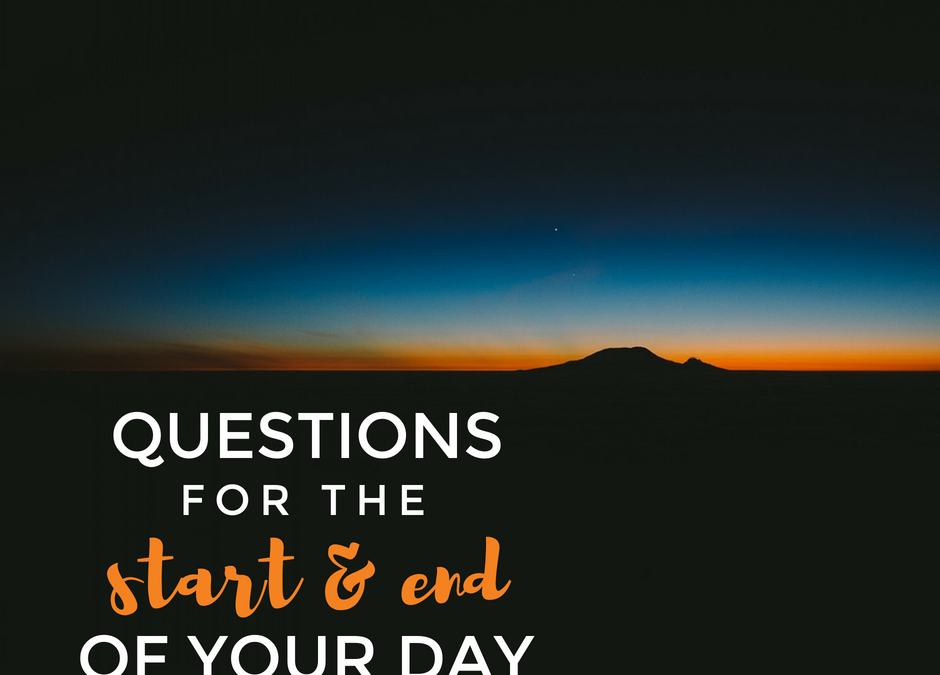
by Naomi | Apr 1, 2016 | Creative Life
In The Art of Possibility, Rosamund Stone Zander and Benjamin Zander point out that this harmless little question might not be so harmless after all. Why? Well, the underlying question for most of us is, “What did I accomplish today?” And the danger is that we’re measuring the value of our day based on our answer.
If you’re a novelist and you spend the day working on a difficult passage, ending up with 500 words, it’s all too easy to judge the day a failure. Only 500 words today. Or, what if at the end of a day of teaching, you realize that you spent most your time resolving a heartfelt conflict in your classroom but hardly any time on spelling?
Asking the wrong question leads to the wrong answer. And the wrong answers, over time, lead to skewed thinking, poor decisions, and too often, a sense of discouragement and confusion.
And yet, reflection is an important part of growth. The momentum that growth brings is key to staying motivated and engaged.
So … What helpful reflection questions might we ask ourselves at the end of the day?
Here are a few I’m going to try.
- When did I feel grateful today?
- When did I feel connected today?
- When did I listen to someone today, and what did I hear?
- What did I learn today?
- What challenged me today?
- What made me curious today, and how might I explore my questions tomorrow?
Donald Miller used to have a course about life-planning. In it, he encouraged people to ask themselves in the morning: “If I could do today over, what would I do differently?” Projecting yourself to the end of the day and thinking about what honestly matters shifts the day’s focus from that addictive to-do list to something more lasting and important.
I’m enjoying the experiment–these book-end question sessions at the start and end of the day. Want to try it out too? I’d love to hear about your experience. Tag me on Instagram or Twitter and let’s chat about it. In the meantime, here’s to you and your creative journey.
by Naomi | Mar 7, 2016 | Creative Life
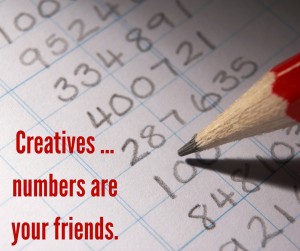 I’ve never been much of a numbers girl. When someone asks what nine times twelve is, I’m reminded of those pages filled with multiplication problems and the clock tick, tick, ticking away. Even now, the memory makes my heart take flying leaps against my rib-cage.
I’ve never been much of a numbers girl. When someone asks what nine times twelve is, I’m reminded of those pages filled with multiplication problems and the clock tick, tick, ticking away. Even now, the memory makes my heart take flying leaps against my rib-cage.
Because of my number dread, I don’t capture data in numbers very often. For the most part, I rely on intuition and my memory.
The thing is, memory can be tricky. Stories can be revised. Intuition, while wise, can also be skewed. What I’ve learned recently is that whether you’re a numbers person or not, numbers are invaluable when it comes to creative problem-solving. It turns out, numbers are our friends.
Yep, you read that right. Numbers are our friends.
As a creative person, I constantly have new ideas sprouting up here and there and everywhere. I’m easily tricked into thinking that I can add “just one more thing” to my already full day. Were I to look at the numbers, I’d see that a day has 24 hours. Some of those hours are required for sleeping, eating, exercising, laughing … There’s a finite number of “just one more things” that a day can hold. The number 24 provides a distinct, specific problem to solve. How will I spend my 24 hours today?
Improvisational actors know that in order to create a great scene, a set of givens is required. The givens lead to interesting questions, and interesting questions lead to unexpected solutions. If the scene must include an elephant, an umbrella and a pickle, the actors can then work on how to make those things happen. The how is what makes the scene hilariously clever.
When you ask yourself, “How might I … ” along with a specific problem to solve, you’re likely to come up with a list that includes a few unusual and delightful solutions. But when you ask yourself, “What should I do about … ” and ponder a vague problem you’re facing, you’ll probably feel frustrated, blocked and stumped.
Let’s try it ourselves:
Q: How much time is there in your week?
A: This one is the same for all of us … 168 hours.
Q: What are your firm commitments and how many hours do they take on average?
A: This one is variable, but includes sleep, exercise, meals, family, and other non-negotiables.
Q: How much time is left over?
A: Time – Firm Commitments = Left Over Time
Q: How might you creatively utilize your left over time?
Let your mind roam here. You’ve done the hard math part, and now you can use your creative gifts. Explore the preposterous, turn the problem on its head, transform the boundaries into opportunities. See what you can come up with. Here’s the excellent news. This strategy goes far beyond offering solutions for your current time crunch. Now, you have a roadmap for tackling all those pesky life questions which have been bugging you.
The process goes like this:
- Gather the numbers and specific givens.
- Allow the numbers to shape a clear understanding of the problem.
- Use that understanding to shape a “How might I … ” question.
- Tap into your creativity to brainstorm a list of possible answers …
- And THEN listen to your intuition to choose which solution to try first.
Give your solution some time to kick in, and then check your results against the numbers. Now, you have a process that allows you to experiment and refine rather than inventing the wheel over and over, having no idea whether you’re making progress at all.
Now, here’s the thing. If you’re anything like me, gathering the numbers will be a little bit painful. Your creativity will lurch and struggle against the hard, firm lines of reality. And yet, that lurching and struggling is actually energy building, energy that will throw itself eagerly into problem solving as soon as you set it free. I promise that the pain is worth the results.
Will you try it for yourself? I hope you do. And when you do, let me know how it goes. Post in the comments below, or share your story with me on Facebook or on Twitter. I can’t wait to hear about your successes!
—
Psst… Do you know about Naomi’s Tinder Box: a weekly collection of curated resources, inspiration and encouragement? Keep your creative spark ablaze … sign up for exclusive access here.
by Naomi | Jan 25, 2016 | Tools & Apps
Naomi’s Playlist is an eclectic collection of tools that help me approach my work as play. My hope is that they’ll do the same for you!
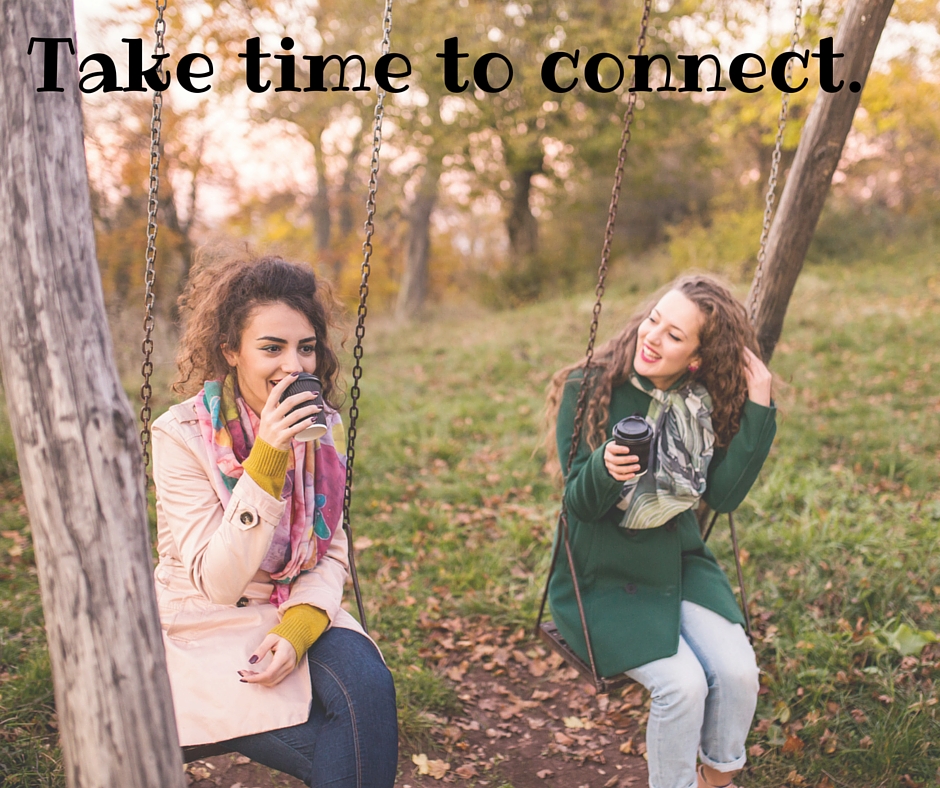
Object: Staying connected with and investing focused energy in friends and colleagues.
What Didn’t Work: Trying to remember to reach out. Only reaching out when I needed something specific. Feeling like I was always losing track of people. Wishing the people I care about knew I was thinking of them. Feeling like a failure because when I did think about reaching out, too much time had passed since the last time I’d connected.
My Aha! Moment: While listening to Dorie Clark’s book, Stand Out, on Audible, I made a few connections I hadn’t made before. First, I realized I was so busy getting things done, I wasn’t bothering to share my broader vision. Second, I realized that there are a lot of people who would want to be included in that vision–people who are already in my community–who I was excluding, simply because I hadn’t thought to reach out. Third, I realized that to actually accomplish something meaningful, people are what count.
However, in the rush of everyday life, it’s too easy to be swept into the tasks that show up in your inbox rather than to remember the bigger picture (and much more important) tasks of staying in touch. So, I started exploring options, and that’s when I found Cloze.
How I Play:
• Cloze is a CRM (customer relationship manager) for everyday people. I use the app on my iPhone, but there is also a web interface and an app for Android.
• As a small business owner, I also use a high-powered CRM, but for daily interactions, I use Cloze. Close creates a daily agenda that reminds me to check in with people, populating the list with contacts based on how often I usually interact with them.
• I’ve gone through and started to categorize contacts. Then, I can assign a certain timing to those contacts so I start interacting more regularly with people I haven’t been contacting enough.
• When someone pops up on my daily agenda, I send a quick email saying hello. It’s always nice to have a personal, friendly email in the sea of requests that floods into an inbox–a breath of fresh air.
Player’s Notes:
• Tags allow you to create specialized lists. For instance, I created a list of experts with whom I want to network. I pull up this list and use the Twitter feed and Linkedin functions of Cloze to see what they’re up to and to help support them through retweeting or linking to their posts.
• Even though Cloze automatically sorts people by using your inbox and interactions with them on social media, the possibilities of this powerful tool are a little overwhelming. Rather than trying to set everything up ahead of time, I do a little each week.
Take it to the Next Level:
• Cloze has functions I haven’t explored yet, including project management and other tools. As time allows, I’m looking forward to exploring those, too. Maybe you can share your tips and tricks with me, if you try it out!
• Cloze allows you to export a list to csv, which can allow you to take a more simplified look at your full list of contacts. Try pulling a list and reviewing for additional networking possibilities.
by Naomi | Jan 12, 2016 | Creative Life
 A week is both longer and shorter than you think.
A week is both longer and shorter than you think.
If you’re anything like me, you might set out on a Monday to do a laundry list of things, thinking that by Friday you’ll surely have time to complete them. Come Friday, you review the list and ugh! At least half of it remains.
As I was considering this sad state of affairs this past weekend, I noticed something interesting. While many boxes on my to-do list weren’t checked off, during the week I’d had a collection of small, interesting encounters. These encounters had started to shift things in my larger world. In fact, some challenged I’d have expected to work on for the rest of the year now had solutions right around the corner.
Which led me to ask myself: Is my to-do list full of the wrong things?
If PEOPLE can cause challenges to untangle, maybe I should spend more time making myself available. Maybe all that time spent on sorting, handling, drafting, researching, planning … maybe it could all be a little less important, if I only made myself more available.
Now, I’m sure that aimless availability wouldn’t have been helpful. But, since I’d spent a good amount of time in December thinking about my big-picture goals, this week, I was primed to pay attention to those things which might make the most big-picture difference.
Here’s a recipe for making progress that I plan to explore. I’ll let you know how it goes.
- Review my goals on Friday, note any progress over the week.
- Identify the chief obstacles. Right now, what’s immediately in the way? What do I need next?
- In relation to those needs and obstacles, think about the people around me. Consider the resources available through friends, co-workers, newcomers who have been suggested to me or who have just crossed my path. Or even online experts–bloggers, podcasters, and more.
- Decide: Who might I reach out to this week? Where might I go this week to encounter someone who just may have a new idea or solution for me?
When I go somewhere new or discuss a problem with a new person, I often find that creative doors and windows are thrown open. Solutions I didn’t expect alight on my shoulders with hardly any effort on my part. It almost feels like cheating. Except, it isn’t. I’m getting out of my own way, looking past my all important to-do list, and realizing that most of the time, the solution is closer than we think. All we have to do is ask.
So, that’s what I’m going to do. A whole lot more asking. Because I may not be able to check off all those to-dos in a week, but if I can ask the right question and toss most of those boxes off my list … well, I’d do that in a heartbeat!
How about you?
by Naomi | Jan 5, 2016 | Creative Life
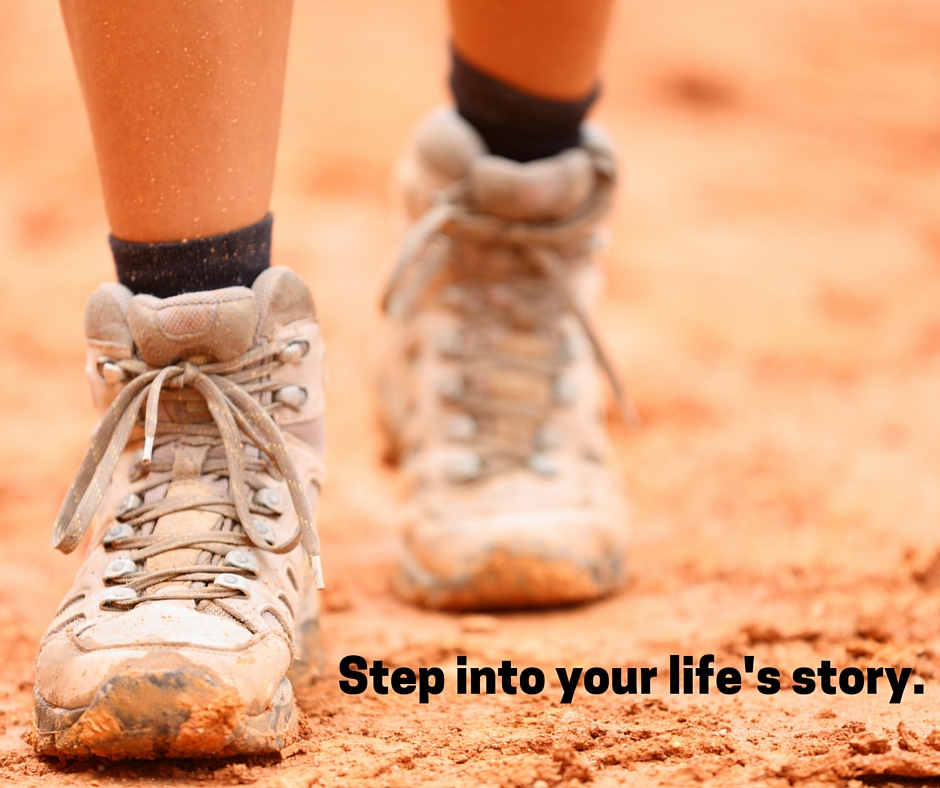 Do stories matter? When I come up against this question, I feel like I’m trying to defend an immutable law of nature, such as, say … gravity. I do that defensive thing and throw out a bunch of words about connection and empathy and imagination, my voice rising with passion. All the while, the person across from me nods and then says something along the lines of, “Yes, but in practical terms …” or “What will get her into college …” or “Where we need to spend our time is …”
Do stories matter? When I come up against this question, I feel like I’m trying to defend an immutable law of nature, such as, say … gravity. I do that defensive thing and throw out a bunch of words about connection and empathy and imagination, my voice rising with passion. All the while, the person across from me nods and then says something along the lines of, “Yes, but in practical terms …” or “What will get her into college …” or “Where we need to spend our time is …”
What breaks my heart is the reply I hear most often: That’s great for you, but I’m not a writer.
The more I think about this commonly held belief, the more it bothers me.
Being able to shape a story is like having a superpower. Unlike most superpowers, this power is completely accessible to anyone willing to learn. How can so many people–the majority of people–believe that writing is for other (more creative) people?
Here’s what story-telling gives you the power to do:
- Make someone laugh
- Enchant someone, or a group of someones
- Cause someone to feel what you feel
- Change someone’s mind, belief system, or actions
- Find a pattern of meaning in your own experiences
- Change your own actions so you can live a more meaningful story
The list could go on and on. The trouble is, this powerful tool dresses itself in whimsy. Stories are so … fun. We consume them for entertainment. It’s so very easy to become convinced that nearly everything else is more important.
Is everything else more important?
Stories connect us, one heart to another. Whether we’re telling real-life narratives or shaping fiction, stories come from our lived experience. When we tell stories, we slow down long enough to pay attention. We find words to express what we see, what we feel, what we believe. We see where change may be needed, and what we can do to effect that change. Rather than an endless stream of experiences, we see that our lives have meaning.
Your life has meaning.
Don’t miss that crucial, beautiful discovery, just because someone told you that you didn’t have writing “skill.” We’re all story-tellers … we live in the midst of a cacophony of stories. Ours and those of everyone around us.
I’m on a mission, friends. I don’t want anyone to get lost in the foggy mess of life. I want to shout this truth from the rooftops: We all live stories–stories full of potential and challenges and victories. Just like any character in a story, our decisions matter. Every single one matters. What decisions will you make?
Some of you already do a lot of writing, but some of you do not. If you’re one of those who does not, would you do one thing for me? Think about a recent life experience. Break it into simple parts: beginning, middle and end. Was there a problem in it, or a challenge? Was any lesson learned? If you had to put the meaning of that experience into a sentence or two, what would it be? Now, set a timer for just five minutes and write that story.
If you are so inclined, share with me how the writing went. I’d love to help and support you on your creative journey.
P.S. I love this video on why stories matter.

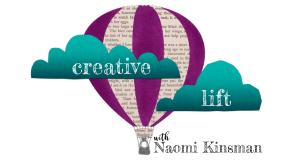
 I’ve never been much of a numbers girl. When someone asks what nine times twelve is, I’m reminded of those pages filled with multiplication problems and the clock tick, tick, ticking away. Even now, the memory makes my heart take flying leaps against my rib-cage.
I’ve never been much of a numbers girl. When someone asks what nine times twelve is, I’m reminded of those pages filled with multiplication problems and the clock tick, tick, ticking away. Even now, the memory makes my heart take flying leaps against my rib-cage. 
 A week is both longer and shorter than you think.
A week is both longer and shorter than you think. Do stories matter? When I come up against this question, I feel like I’m trying to defend an immutable law of nature, such as, say … gravity. I do that defensive thing and throw out a bunch of words about connection and empathy and imagination, my voice rising with passion. All the while, the person across from me nods and then says something along the lines of, “Yes, but in practical terms …” or “What will get her into college …” or “Where we need to spend our time is …”
Do stories matter? When I come up against this question, I feel like I’m trying to defend an immutable law of nature, such as, say … gravity. I do that defensive thing and throw out a bunch of words about connection and empathy and imagination, my voice rising with passion. All the while, the person across from me nods and then says something along the lines of, “Yes, but in practical terms …” or “What will get her into college …” or “Where we need to spend our time is …”